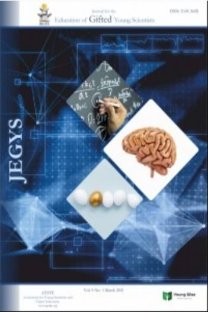Web Application of Knowledge Management in Broiler Production in Agriculture for Vocational Education
knowledge management web application, broiler production, learning achievement, vocational education,
___
- Adfca (2014). Guidelines of biosecurity general aspects of biosecurity volume 1. Abu Dhabi Food Control Authority Endorsed by BOD 03 November 2014. https//www.adfca.ae/English/PolicyAndLegislations/Guidelines/Documents/Guide.
- Ali, A. (2014). The effect of inquiry-based learning method on students ‘academic achievement in science courses. Universal Journal of Educational Research, 2(1): 37-41.
- Apinya, K., Wawta, T., & Jutharat, S. (2018). Factors Related to knowledge management process of Institute of Dentistry, Department of Medical Services, Ministry of Public Health. Library Journal, Srinakharinwirot University, pp.14-29.
- Arpamo, W., Au-areemit, S., & Wongprasert, C. (2017). The state of knowledge management of Rajabhat Maha Sarakham University. Journal of Information Science, 35(4), 92-114
- Changsap, B., et al. (2017). A comparison of anatomy learning achievement and affecting factors of the students learned by the application of AIC Technique and the Conventional Method. Huachiew Chalermprakiat Academic Journal, pp. 29-39.
- Collins, H. (2010). Tacit and explicit knowledge. The University of Chicago Press, 60037, Chicago Ltd, London.
- Daniel, Y.S., & Yi-Shun, W. (2008). Multi-criteria evaluation of the web-based e-learning system: A methodology based on learner satisfaction and its applications. Computers & Education, 50(3), 894-905
- Injana, W., Intorrathed, S., Phonpakdee, R., & Poungsuk, P. (2015). Knowledge management adoption of animal husbandry on broiler farms in western Thailand. International Journal of Agricultural Technology, 11(8), 2295-2300. http://www.ijat-aatsea.com ISSN 1686-9141 2295.
- Injana, W., Phonpakdee, R., Poungsuk, P., & Petsangsri, S. (2019). Creation of a knowledge management process in broiler production of Thailand. International Journal of Agricultural Technology, 15(2), 273-286. http://www.ijat-aatsea.com ISSN 1686-9141 2295.
- Intorrathed, S. (2013). Principles of agricultural education. Bangkok: Mean service
- Jaratheerasanti, P. (2015). The methods for knowledge management in industrial sector: A case Study of industrial estates throughout Thailand. Humanities and Social Science Research Promotion Network Journal: HSRNJ, pp.60-72.
- Mativanun, S., & Jayagopal, P.A. (2019). Big data virtualization role in agriculture: A comprehensive review. Walailak Journal Science and Technology, 16(2), 55-70.
- Musika, A , Poungsuk, P , Siriwan, N , & Intorrathed, S . (2019). Relationship between Curriculum and Instructional Materials of Non-formal Agricultural Higher Education. Journal for the Education of Gifted Young Scientists, 7(3), 515-529. DOI: 10.17478/jegys.605364 Kara, N. (2019). Impact of digital media on gifted students’ career choices. Journal for the Education of Gifted Young Scientists, 7(2), 99-112. DOI: http://dx.doi.org/10.17478/jegys.555339
- Office of system development and livestock product certification. (2016). Available at: http://certify.dld.go.th/certify/index.php/th/2016-10-10-12-15-38
- Roengprapan, C. (2002). Basic statistics together with examples of analyses by using Minitab SPSS and SAS. Khonkaen: Khonkaen University.
- Ramadhani, R., Umam, R., Abdurrahman, A., & Syazali. M. (2019). The Effect of Flipped-Problem Based Learning Model Integrated with LMS-Google Classroom For Senior High School Students. Journal for the Education of Gifted Young Scientists, 7(2), 137-158. DOI: http://dx.doi.org/10.17478/jegys.548350
- Pramphet, W., & Sungtong, E. (2015). Model of knowledge management for teacher development: A case study of Nampudpotaram Cluster School, Trang Primary Educational Service Area Office 1. Journal of Liberal Arts Prince of Songkla University, 7(2), 59-77.
- Saduak, W., Poungsuk, P., Phonpakdee, R, & Deeying, S. (2019). School Agricultural Learning Center for Sustainable Agricultural Learning. Journal for the Education of Gifted Young Scientists, 7(3), 389-407. DOI: 10.17478/jegys.582993
- Sommart, M. & Kosaiyanon, L. (2011). Knowledge management for the development of Yala Provincial Administrative Organization. Local Administration Journal. pp. 100-114.
- Suetomi, K. (2014). Reform of the education finance system as the foundation of compulsory education. Educational Studies in Japan: International year book. 8:143-158.
- Trimongkhonkul, P., & Chattraporn, S. (2012). Research Design. 7th edition. Bangkok: Kasetsart University Press.
- Tortop, H.S. (2013). Meaningful field trip in education of the renewable energy technologies. Journal for the Education of Gifted Young Scientists, 1(1), 8-15. DOI: 10.17478/JEYSG.201318998.
- Ungsitthipoonpor, S., & Laparpon, K. (2016). Knowledge Management (KM): Transmitting local wisdom of the Hakka community on-line-success and challenges. Language and Culture Journal, pp. 203-225.
- World Economic Forum (2016). New vision for education: Fostering social and emotional learning through technology. http://www3.weforum.org/docs/ WEF_New_Vision_for_Education.pdf.
- Başlangıç: 2013
- Yayıncı: Genç Bilge Yayıncılık
Munifah ., İskandar TSANİ, Muhamad YASİN, Ninik ZUROİDAH, Syamsul HUDA, Fitria LESTARİ, Ali RAHMAT
Adeeb JARRAH, Hanan ALMARASHDİ
Oranit CHOKCHAİ, Paitoon PİMDEE
Muhamad YASİN, Durrul JAUHARİYAH, Madiyo MADİYO, Rika RAHMAWATİ, Fajri FARİD, İrwandani IRWANDANİ, Frendy Fitra MARDANA
Rosdiana ROSDİANA, İ Ketut BUDAYASA, Agung LUKİTO
Ahsan ABDULFATTAH, Supahar SUPAHAR
Fitri WAHYUNİ, Bambang Budi WİYONO, Adi ATMOKO, İm HAMBALİ
Syahfitri PURNAMA, Farikah FARİKAH, Burhan Eko PURWANTO, Sri WARDHANİ, İdham KHOLİD, Syamsul HUDA, Watcharin JOEMSİTTİPRASERT
